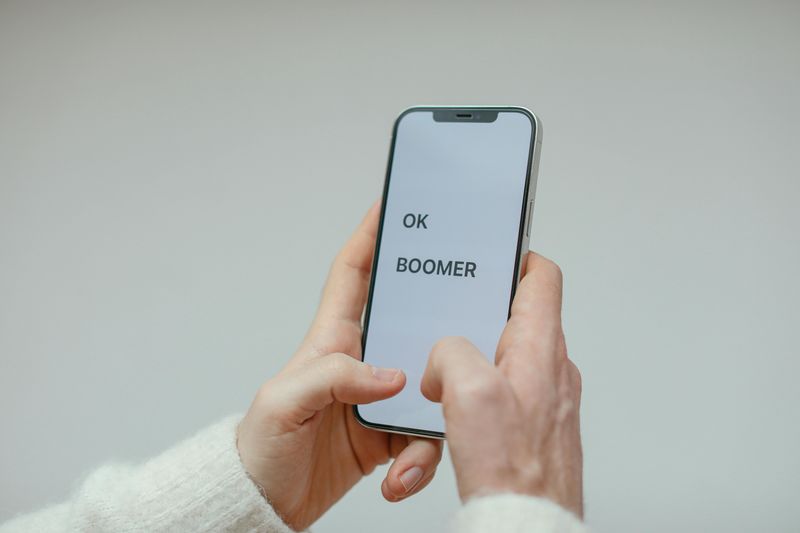1. Introduction

Navigating the generational divide is often a dance of understanding and humor. As times change, certain boomer habits have become a source of both endearment and frustration for younger generations. Whether it’s forwarding chain emails or insisting on paying by check, these quirks can be as baffling as they are amusing. In a world that’s increasingly digital and progressive, some old-school behaviors stick out like a vintage rotary phone at a tech conference. While some moves are harmless, others can feel tone-deaf or outdated. Let’s take a light-hearted look at some of these classic boomer moves that we’re ready to retire.
2. Forwarding Chain Emails Like It’s Still 2003

“If you don’t forward this to 10 people, you’ll have bad luck for a year.” Ah, the humble chain email. Once a staple of early internet culture, these messages promised everything from fortune to friendship, provided you passed it on.
For boomers, these emails were a social currency, a way to connect and share with friends and family. But let’s face it, in the age of instant messaging and social media, forwarding a chain letter feels as outdated as using dial-up internet. While the sentiment might be sweet, it’s time to hit delete and connect in more meaningful ways.
3. Leaving Voicemails for No Reason

Just text. Please. In a world where communication is instant, leaving a voicemail can feel like sending a telegram. Boomers, who might view voicemails as a detailed way to communicate, often leave messages that simply say, “Call me back.”
But for younger generations, who prioritize efficiency (and loathe listening to lengthy recordings), a simple text would suffice. Voicemails may hold a certain nostalgic charm, but they often become a source of frustration when a quick text would do the trick. It’s time to embrace the brevity and clarity of text messaging.
4. Complaining About ‘Participation Trophies’ While Hoarding Bowling League Ribbons

Ah, the participation trophy debate. For boomers, these little symbols of acknowledgment often epitomize the fall of hard-earned success. Ironically, many of these same critics proudly display their own collection of bowling league ribbons and trophies.
While participation awards aim to encourage and include, the older generation sees them as a dilution of true achievement. However, one can’t help but see the humor in the situation – after all, isn’t a ribbon just a token of participation? Perhaps it’s time to focus less on the accolades and more on the joy of the game.
5. Talking Loudly on Speakerphone in Public

We all now know what your cousin’s gallbladder surgery cost. Thanks. Using a speakerphone in public can be a broadcast of personal conversations to an unintended audience. Boomers might argue that it’s convenient or that they can’t hear well, but it often disrupts the peace of shared spaces.
Public places become stages for private theatrics, with every passerby an unwilling participant in the drama. Keeping conversations private is a courtesy that’s increasingly overlooked, leading to moments where personal stories become public knowledge. It’s time to take it off speaker and keep the drama to ourselves.
6. Writing Passive-Aggressive Facebook Statuses About “Certain People”

If you have something to say… maybe just say it to that person? The art of the indirect social media post is one that boomers seem to have mastered. Vague statuses about “certain people” can be as intriguing as they are frustrating.
They leave the audience guessing and gossiping, trying to piece together the mystery. For those on the receiving end, it can feel like a high school drama unfolding on their newsfeed. Instead of airing grievances online, perhaps it’s better to approach conflicts directly. After all, clarity trumps ambiguity every time.
7. Using … Ellipses … Like … This

Is something wrong? Are you trailing off? Are you okay? The ellipsis, when used sparingly, adds dramatic pause or indicates unfinished thought. However, the boomer tendency to pepper sentences with ellipses can leave younger readers perplexed.
Each dot seems to hint at hidden meanings or unresolved issues. While it’s unclear why this style is preferred, it often feels like the written equivalent of a long, uncomfortable pause. For clarity and cohesion, it might be best to limit ellipses, ensuring messages are straightforward and unambiguous. Let’s save the suspense for the movies.
8. Insisting on Paying Bills With a Check at Restaurants

Waiters everywhere just sighed in unison. Paying by check is a nostalgic nod to a simpler time, but in today’s fast-paced world, it can be a cumbersome process. Boomers may view it as a secure and tangible transaction, while the rest of us are swiping, tapping, and scanning our way through life.
Writing out a check, waiting for approval, and balancing the checkbook takes time, much to the chagrin of everyone else in line. While checks evoke memories of the past, embracing digital payments could save time and effort for everyone involved.
9. Bragging About Not Needing Technology—Then Asking for Help with It

“I don’t do all that tech stuff.” Proceeds to ask how to attach a PDF. The irony of this statement is often lost on those who utter it. Boomers may pride themselves on their ability to function without modern technology, only to find themselves needing assistance with the very devices they dismiss.
This contradiction highlights a resistance to change, coupled with an eventual reliance on the digital world. While technology can be daunting, embracing it can lead to independence and empowerment. Irony aside, a little tech savviness goes a long way in today’s world.
10. Saying “Back in My Day…” to Shut Down Any New Idea

Cool, but back in our day, we had boundaries and therapy. The phrase “Back in my day…” is often used to romanticize the past and dismiss present innovations. Boomers may use this as a way to assert wisdom and experience, but it can come across as dismissive of new ideas and progress.
While nostalgia has its place, it’s important to acknowledge that each generation faces unique challenges and embraces new solutions. Instead of shutting down dialogue, let’s open the floor to fresh perspectives and shared learning. After all, progress is built on the ideas of today.
11. Refusing to Believe That Mental Health Is Real

No, Susan, “going for a walk” does not cure clinical depression. Mental health awareness has grown significantly in recent years, yet some boomers remain skeptical of its legitimacy. They might view mental health struggles as signs of weakness or something to be shrugged off.
While older generations often relied on stoicism, today’s society increasingly recognizes the importance of mental well-being. Encouraging understanding and breaking down stigmas is essential for supporting friends and family. Embracing mental health as a real and vital component of overall wellness can lead to a more compassionate and informed society.
12. Expecting Gratitude for ‘Showing Up’ as a Parent

Basic parenting isn’t a personality. Try again. Some boomers might expect appreciation for their parental involvement, viewing it as a noteworthy achievement. While being present is important, it’s also a fundamental aspect of parenting, not an extraordinary feat. Younger generations recognize that consistently showing up is part of the job description.
Parenting is a complex, ongoing effort that requires more than attendance to earn accolades. Instead of seeking praise for basics, sharing experiences and building relationships create meaningful connections. Perhaps it’s time to redefine what it means to be an engaged and supportive parent.
13. Turning Every Conversation Into a Lecture About “Hard Work”

We’re working hard. We just don’t feel the need to suffer unnecessarily. Boomers often equate struggle with virtue, emphasizing hard work as the ultimate path to success. This mindset can lead to lectures on perseverance and sacrifice, leaving younger listeners feeling misunderstood.
While dedication is admirable, it’s also essential to recognize different paths to achievement and well-being. Today’s workforce values efficiency, creativity, and balance, challenging the notion that success comes only from toil. By acknowledging diverse approaches to work, we foster a more inclusive and understanding dialogue across generations.
14. “It’s Just a Joke!” After Saying Something Sexist, Racist, or Homophobic

Ah yes, the timeless boomer defense mechanism. No one’s laughing. The phrase “It’s just a joke!” is often used to deflect criticism when a remark crosses boundaries. While humor can be a way to connect, it can also perpetuate harmful stereotypes and offend others.
Boomers may argue that their intent wasn’t malicious, but it’s important to consider impact over intent. Acknowledging when a joke doesn’t land and learning from it can be more constructive than doubling down. Humor evolves, and being mindful of respectful and inclusive language ensures everyone can share a laugh without discomfort.

Comments
Loading…